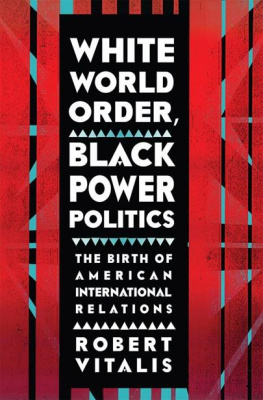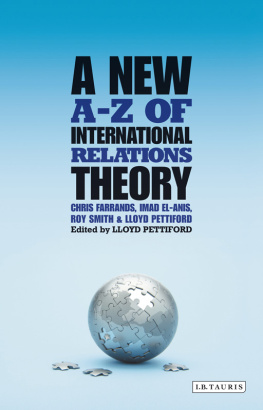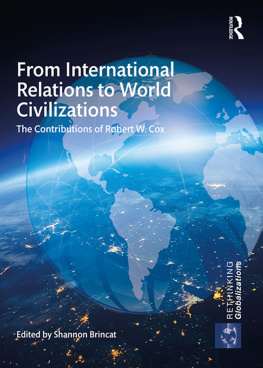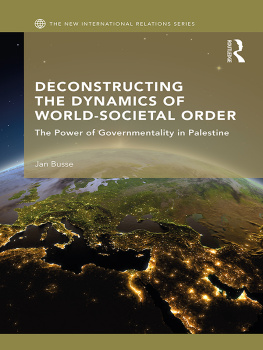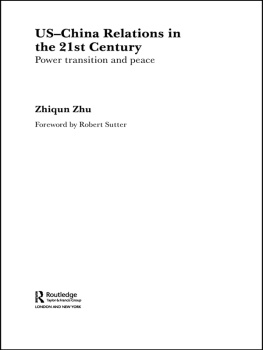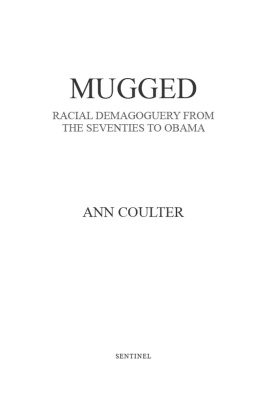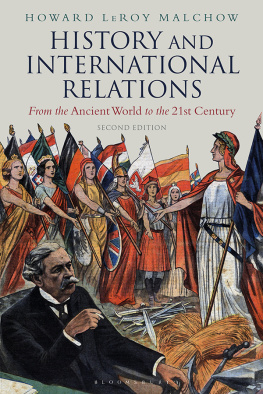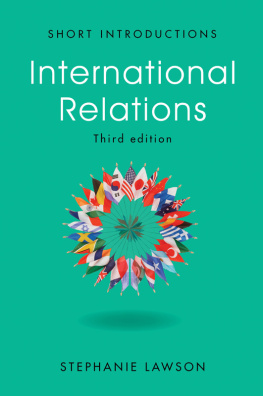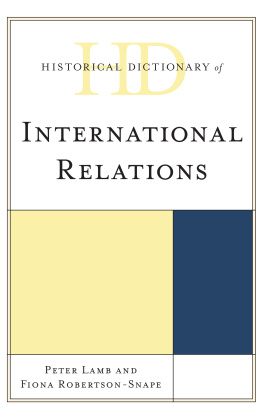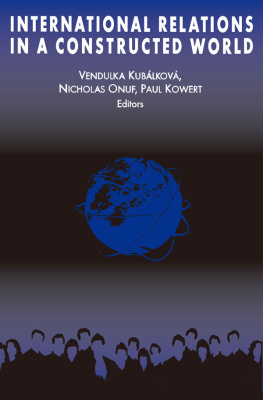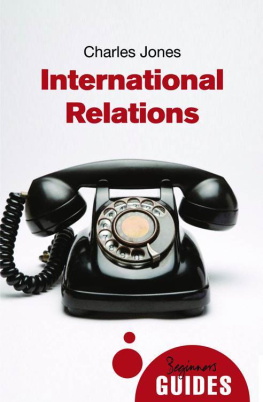WHITE WORLD
ORDER, BLACK
POWER POLITICS
THE BIRTH OF AMERICAN
INTERNATIONAL RELATIONS
Robert Vitalis
CORNELL UNIVERSITY PRESS
Ithaca and London
For Chloe and Phoebe
Contents
Preface
This book has its origins in a cold, gray December afternoon in Worcester, Massachusetts, as I wandered through Clark Universitys Goddard Library. During its founding decades, Clark was at the forefront of the development of graduate education in the United States, but those days are long gone. I was teaching International Relations there in the early 1990s and working hard to avoid my students final papers when I pulled William Koelschs history of the school off the stacks. In the section discussing Clarks signal contributions to early twentieth-century social science, Koelsch credited psychologist G. Stanley Hall and historian (and, after 1915, professor of history and international relations) George Hubbard Blakeslee with starting the disciplines first specialized journal, the Journal of Race Development , in 1910, which the editors renamed the Journal of International Relations in 1919.
This cant be correct, I thought. Everyone in the field understands that the new post-Versailles internationalist think tanksthe Royal Institute of International Affairs in London and the Council on Foreign Relations in New Yorkrolled out the fields first journals in the mid-1920s. Koelsch, though, was in fact right. My eye-opening reeducation began with the brittle pages of the twelve bound volumes of the forgotten journal and, from there, the Blakeslee Papers at Clark and the Hamilton Fish Armstrong Papers at Princeton University. These records let me piece together the story of the sale of Blakeslees magazine to the Council on Foreign Relations, relaunched with its new, they hoped, punchier title, Foreign Affairs .
It took some time for this more accurate story of the origins of the field of International Relations to circulate. I began giving papers at conferences on the early history in 1998 and published the first version in 2002. Blakeslees signal contribution is not referenced there.
Despite this historical amnesia, the journal matters because of what it tells us about the constitutive role of imperialism and racism in bringing an academic discipline in the United States into existence. The evidence of the racist foundations of International Relations grew overwhelming as I continued my investigation. My archival research included the private papers of long-forgotten faculty in Cambridge, Chicago, Madison, New York, Princeton, and the Library of Congress in Washington, D.C., and extended to the records of foundations and the many white (of course never identified as such) internationalist associations, institutes, research centers, and schools that the Rockefeller Foundation and Carnegie Corporation subsidized in the early decades of the twentieth century. Suffice it to say that the history I uncovered is not how practitioners understand the past of their professionfar from it. It is not the inspiring kind of story that Americans prefer to hear about themselves.
The discovery of the first journal opened my eyes in a second, much more personal and consequential sense. Hall and Blakeslee had invited W. E. B. Du Bois, the giant of twentieth-century thought, or so I came to view him, to join as a founding member of the editorial board. Du Bois published two essays in the Journal of Race Development , including most of what became Souls of White Folk, the most powerful chapter in his incendiary Darkwater: Voices from within the Veil (1920). Foreign Affairs published him five more times in the next decades before the government began its persecution of the 83-year-old firebrand and alleged subversive. I wondered how had I gone through college and a PhD program in political science and not read him, and I resolved to make up for lost time.
Encountering Du Bois for the first time at age 40around the time I was promoted to associate professorinfluenced the direction of my research but also changed what I would do in the classroom. My retraining began with teaching a course on Du Bois in global perspective with Clark historian Janette Greenwood. Team teaching the undergraduate seminar was a way of learning on the run, which left me wanting to study Du Bois and the thought of other African American thinkers in more depth. So I took a year off from teaching and from research on the Middle East, my ostensible area of specialization, to study African American social and intellectual history with Nell Painter and Kevin Gaines (both then at Princeton) and the history of the science of race with Adolph Reed Jr. (then at the New School of Social Research and now a colleague at the University of Pennsylvania.) Subsequently I began reading the published works and private papersat UCLA, the Library of Congress, and most crucially at Howard Universityof the African Americans who were most engaged, together with the towering Du Bois, in the debates in the field of U.S. international relations in the first half of the twentieth century. Ultimately, that research transformed my understanding of the history and sociology of the discipline.
The African American scholars and the dissections of racisms role in the global imperial order have disappeared from the histories that the vast majority of professors of international relations in the United States tell about themselves and their work today. They view the past the way I once did, with a similar set of blinders. It is thus no surprise that many see and know of no connection between the practices of hierarchy and the field of international relations in the United States. The evidence, on many accounts, is just not there.
In a first-year graduate methods course in the social sciences, students learn to think in terms of a null hypothesis; that is, the default idea that no relationship exists between two phenomena. The central task for the social scientist is to use inferential statistics to establish the grounds for rejecting or disproving the null hypothesis. Multiple times in the course of justifying this project to peers in the profession I was told that black thinkers, beginning with Du Bois, arent taught in international relations courses because none wrote anything of importance to it. In the chapters that follow, I marshal the archival evidence that forces us to reject that ideathe null hypothesis, in this caseas false, just as it has been rejected in discipline after discipline in the United States in the wake of the black studies revolution that has rewritten the intellectual and social history of the academic professions and of the wider world beyond.
Acknowledgments
Thanks go first to those who subsidized the work: the American Political Science Association, Clark University, the University of Pennsylvanias Christopher H. Browne Center for International Politics and the University Research Foundation, the joint Peace and Security Committee of the Social Science Research Council and the MacArthur Foundation, and the Woodrow Wilson International Center for Scholars. I have never had as much difficulty raising funds as I have had with White World Order, Black Power Politics , and I want to express my gratitude in particular to all the reviewers, committee members, and trustees who fought on my behalf (and, incidentally, confirm the validity of the sociological model of academic knowledge production that informs the book). I include the allies I know by name below.
I am grateful to Cambridge University Press for permission to republish (as chapters one and two) my essay The Noble Science of Imperial Administration and Its Laws of Race Development, which originally appeared in Comparative Studies in Society and History in 2010.
The list of advisors, caregivers, critics, and patrons is long, and I am sure I have forgotten a few. Thanks go to Begum Adalet, Hisham Aidi, Raphael Allan, Lisa Anderson, Osman Balkan, Duncan Bell, Tom Bender, Donald Blackmer, Bridget Blagoevski-Trazoff, Jessica Blatt, Cathy Boone, Terry Burke, Zoltan Buzas, Neta Crawford, Victoria de Grazia, David Ekbladh, David Engerman, Cynthia Enloe, Betsy Esch, Joe Feagin, Tom Ferguson, Kevin Gaines, Kim Gilmore, Julian Go, Jane Gordon, Lewis Gordon, Janette Greenwood, David Grondin, Nicholas Guilhot, Charlie Hale, Michael Hanchard, Deborah Harrold, Vicky Hattam, Errol Henderson, John Hobson, Alan Hunter, Amy Kaplan, Persis Karim, Lauren Kientz, Ellen Kennedy, Bruce Kuklick, the late and sorely missed Riki Kuklick, Paul Kramer, Bob Latham, Tilden LeMelle, Daniel Levine, Lily Ling, Zachary Lockman, David Long, Wahneema Lubiano, Ian Lustick, Ed Mansfield, Mark Mazower, Michael McGandy, Gil Merkx, Tim Mitchell, Anthony Monteiro, Dan Monk, Anne Norton, Amy Offner, Nell Painter, Jason Parker, Susan Pedersen, Brenda Plummer, Vijay Prasad, Adolph Reed Jr., Katharina Rietzler, David Roediger, Dorothy Ross, Kevin Rugamba, Ashley Salisbury, Barbara Savage, Brian Schmidt, George Shepard Jr., Robbie Shilliam, Brad Simpson, Nikhil Singh, Rogers Smith, Steve Smith, Ted Swedenburg, the Tabard Inn, Gaetano Di Tommaso, Evalyn Tennant, Deborah Thomas, Ann Tickner, Peter Trubowitz, Penny Von Eschen, Srdjan Vucetic, Kate Wahl, Alex Weiseger, Stephen Wertheim, Donald Will, Howard Winant, Michael Winston, Kent Worcester, Kevin Yelvington, Marilyn Young, and Tukufu Zuberi.
Next page
